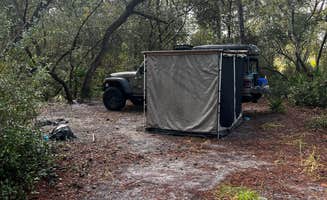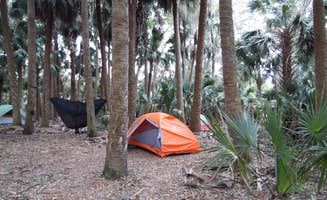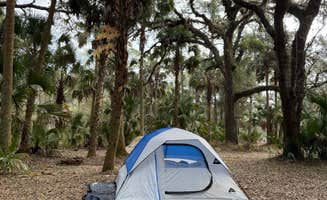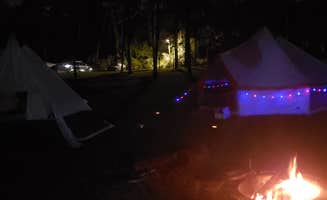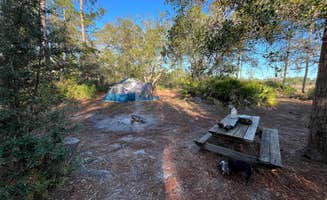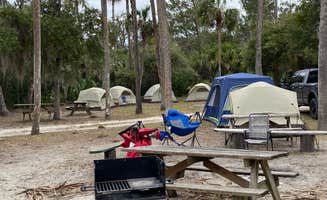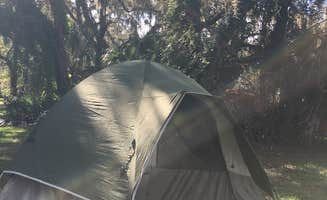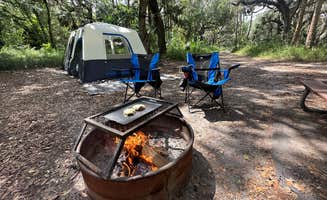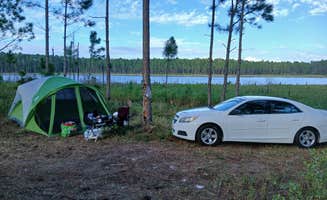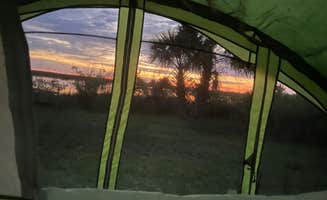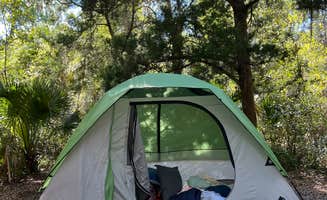Primitive camping options near DeLand, Florida offer varied experiences across state forests and wilderness areas. The region features several locations with water access along the St. Johns River and its tributaries, with summer temperatures regularly reaching 90°F and high humidity levels from June through September. Winter camping provides more comfortable conditions with temperatures typically ranging from 50-70°F during the day.
What to do
Paddle the waterways: At Hontoon Island State Park Campground, campers can enjoy paddling opportunities with island access. "It's a terrific day half day paddle around the island via kayak too. Mosquitos are thick, bring bug spray! Watch for snakes," advises reviewer Ellen E. The park's location provides excellent wildlife viewing opportunities.
Wildlife observation: Multiple campgrounds offer chances to spot native Florida species. "This is a unique park to camp in. You can come on your own boat or take the free ferry over (donations are encouraged)," explains Billy A. about Hontoon Island. The area supports diverse ecosystems where campers regularly encounter turtles, birds, and occasionally alligators.
Spring swimming: At King's Landing, campers can access crystal clear springs. "The springs are crystal clear, especially when you're the 1st one out there in the a.m. which is a huge perk of camping here," notes Chad N. The springs maintain a constant 72°F temperature year-round, providing refreshing swimming opportunities even during hot summer months.
Hiking trail exploration: The region offers several trail systems through varied ecosystems. "You could spend an entire day just getting lost around the trails. So much fun. Not a very difficult trial though," writes Hannah S. about East Camp — Little Big Econ State Forest. Most trails are relatively flat with some sandy sections and occasional boardwalks over wet areas.
What campers like
Secluded water access: Many campers appreciate the relative privacy at certain sites. "It's super secluded and quiet. Depending when you stay there's at times people who show up to party and then leave. Sites are primitive. Great place to put a kayak in the water," reports Adamm A. about Freak Creek Dispersed Camping. Sites near water typically require advance reservations during peak seasons.
Island camping experience: The boat-access requirement at Hontoon Island State Park Campground creates a unique atmosphere. "This park is accessible only by ferry, which makes for a unique and rustic camping experience that is totally worthw the extra effort," writes Megan K. The ferry runs throughout the day, making island access convenient despite the extra logistics.
Night sky viewing: Several primitive camping areas offer minimal light pollution. "This is a good place to come to see the stars! Jumper camp is a primitive area with a picnic table and a fire ring. Great for large groups or a backpacker," states Mike G. about Seminole State Forest Primitive Campsites. The rural location provides opportunities for stargazing away from urban centers.
Riverside camping spots: Campsites positioned along waterways receive positive reviews. "Traditional rustic Florida... The camping spots are primitive but are in areas that you seldom find in more densely populated areas," notes Steven V. about Little Big Econ State Forest. These sites typically accommodate 1-2 tents in cleared areas with fire rings.
What you should know
Access challenges: Some sites require specific vehicles or preparation. "The main road in has huge deep ruts, the other road has a water crossing that was over my bumper on my lifted Mojave," explains Hilary G. about Freak Creek Dispersed Camping. Always check road conditions before attempting access with standard vehicles.
Variable amenities: Facilities differ significantly between locations. "Bathrooms are locked after dark. We were given a gate code but could not find the way to unlock any of the gates," reports Brian T. about Gemini Springs Campground. Many primitive sites have no facilities whatsoever, requiring complete self-sufficiency.
Reservation requirements: Most established campgrounds require advance booking. "To get to this camp you will have to hike in along old levy's some just over a foot wide. Much of the trail is sloped to one side or the other," writes Jeanene A. about Black Bear Wilderness Area. Permits for primitive camping areas must often be secured before arrival through forestry offices.
Weather considerations: Florida's climate affects camping comfort significantly. "In summer at nights mosquitos come out here and will eat you up no matter how much bug spray you put on," cautions Brooklee E. about Little Big Econ State Forest. The rainy season from June through September can create muddy conditions and occasionally flood low-lying campsites.
Tips for camping with families
Cabin options: For families wanting more comfort while tent camping near DeLand, Florida, consider cabins. "Super cute secluded cabin directly on the lake. You have your own private boat slip, 100ft long dock for fishing & swimming, canoes/paddles/life jackets on site," describes Aubrey O. about Lake Dorr Cabin. These accommodations typically cost $60-100 per night and require earlier reservations than tent sites.
Wildlife precautions: Prepare children for encountering native species. "This entire area is infested with raccoons and black bears, so you want to make sure that all of your food and gear doesn't run off in the middle of the night," warns Stuart K. about King's Landing. Food storage in vehicles or secured containers prevents wildlife problems.
Ferry adventures: The boat transportation required for some sites adds interest for children. "The trip to the island on the ferry was quick and easy. There was a great playground for the kids and we enjoyed a nice long hike as well," shares Sara S. about Hontoon Island. The ferry runs every 30-60 minutes during daylight hours.
Water activity planning: Schedule water activities strategically. "The line to get in for non-campers gets really long fast so being able to be the 1st ones on the river is awesome," notes Chad N. about King's Landing. Morning water activities typically offer both cooler temperatures and fewer crowds.
Tips from RVers
Site limitations: Most primitive camping areas near DeLand cannot accommodate larger RVs. "It sounded like I'd have the ability to get it there. Well, I did, with a few broken dishes and messing up the camper a bit. Plus my truck broke down trying to get through the roads," cautions Adamm A. about Bluff Landing. Small trailers under 20 feet may access some sites with proper tow vehicles.
Parking considerations: Alternative arrangements may be necessary for larger rigs. "This is a good spot just off the road/trail. Small and kind of tight in the official camping area with three spots kind of spread out. Tight in here, so would not recommend a trailer," advises Brian about Bluff Landing. Some areas offer separate parking areas within walking distance of tent sites.
Supply transportation: Plan for moving camping gear from vehicles to sites. "The campsites are about a half mile from the docks and they even have a van to take your stuff to your site if you can't take it your self," notes Billy A. about Hontoon Island State Park. Collapsible wagons or carts can help transport supplies to walk-in sites.


